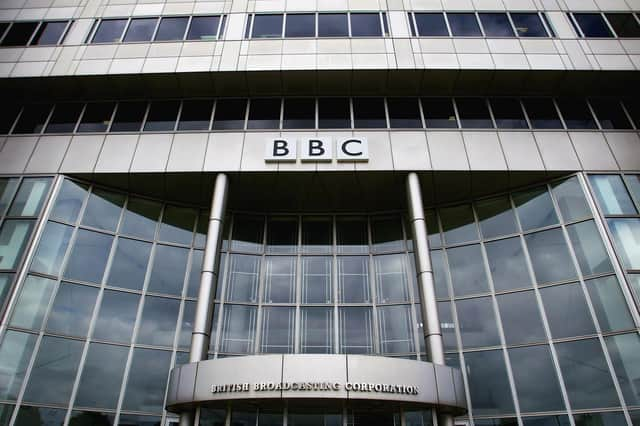Letters - Monday, January 31, 2022


The BBC certainly polarises views on its standard of broadcasting and a near-mandatory requirement for most of the general public to pay a licence fee – £159 for a colour TV and £53.50 for black and white. Around 7,000 people still pay for black and white only – mostly in London as some say it is chic!
These fees will be in place until April 2024, then rise in line with inflation until March 2028: known as settlement fees they will raise around £23 billion paid to the BBC by the end of the settlement period. The government pays £90 million per year directly to pay for the World Service.
Advertisement
Hide AdAdvertisement
Hide AdIt appears that the BBC will be with us for at least six years, so we should make the most of exemptions and reductions.
For instance, care home residents and staff may only have to pay £7.50 per year, if you are severely sight impaired there is a 50 per cent reduction. Students are not covered by their parents' TV licence unless the student only ever uses devices that are powered solely by their own internal batteries and they do not plug them into an aerial or the mains. You don’t need a licence if you never watch or record live TV programmes on any channel or never download or watch BBC live or iPlayer – live, catch-up or on demand.
I could go on, but it may be that without looking at the rules in detail it’s so easy to just stump up and feel peeved about doing so with the threat of legal action if we do not get a licence.
I hope this helps in the interim period between now and 2028, when I suspect we will be looking at things differently.
Mike Marlow
via email
TELEVISION
BBC has served the country well
Advertisement
Hide AdAdvertisement
Hide AdWith regards to Dick Lindley (Your Say, Gazette, January 29) stating that the BBC is “anti-Tory, anti-British propaganda and a constant menu of very old repeats”, I would have thought that the BBC’s role, being the national broadcaster, was to deliver the facts and not promote propaganda in any form.
In his missive he mentions Culture Secretary Nadine Dorries who, at the last Tory party conference, suggested that the BBC wouldn’t exist in 10 years’ time.
Well I will give her my prediction: The BBC will still exist in 2031, however I am doubtful if she, or the Tories, will be still in power.
This year sees the centenary of the BBC, an organisation which has served this country remarkably well over the years. It is respected around the world for its high standard of accurate news broadcasting and programme content.
Advertisement
Hide AdAdvertisement
Hide AdThe way the BBC is funded means that it can experiment with different forms of entertainment without the constraint of commercial consideration. I wonder if Monty Python, Dad’s Army or Strictly would have seen the light of day if money making was a main consideration?
Can I suggest to Mr Lindley that he details the programmes he dislikes?
Ian Barnes
Address supplied
TRANSPORT
Rethink needed on the Highway Code
Apparently the new version of the Highway Code introduces a hierarchy of road users, with those who can do the most harm having the greatest responsibility to reduce the danger they pose to others.
So drivers of motorised vehicles have to take more care and are more culpable than cyclists or pedestrians.
Advertisement
Hide AdAdvertisement
Hide AdCan someone explain to me how this squares with the often seen scenario of the car driver driving along perfectly correctly only to have some idiot engrossed in their smartphone stepping straight in front of them without looking?
Surely, in that case, the most vulnerable road user is responsible for causing the most harm?
Perhaps a rethink is required.
Paul Morley
via email
ENERGY
They’re laughing all the way to the bank
Successive Governments are responsible for the hike in gas and electric bills. Too much priority has been given to impressing the world with our zero emissions policy.
We could have been self sufficient in energy with wave power, fracking and small nuclear plants. Instead we are saddled with wind farms which are expensive and dependent on weather.
Advertisement
Hide AdAdvertisement
Hide AdIf the wind is too strong they have to be turned off, and produce expensive electricity, while being a n eyesore. The solar panels work but don’t if the sun doesn’t shine. The power they produce cannot be stored and the National Grid has had to turn to the gas and coal-fired power stations for back up.
What will happen with more electric cars and trains in the future? We will end up buying power from countries who ignore climate change and laugh all the way to the bank.
T&P Watson
Via email
Thanks for reading. If you value what we do and are able to support us, a digital subscription is just £1 for your first month. Try us today by clicking here
Comment Guidelines
National World encourages reader discussion on our stories. User feedback, insights and back-and-forth exchanges add a rich layer of context to reporting. Please review our Community Guidelines before commenting.